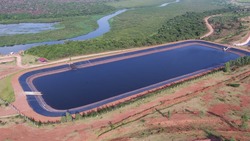Israel21c | 21 August 2023
Israeli coworking farm hub in Rwanda to ensure food security
by Abigail Klein Leichman
The unique site, with a purpose-built water source and energy network, was designed by irrigation giant Netafim with funds from Rwanda’s government.
by Abigail Klein Leichman
The unique site, with a purpose-built water source and energy network, was designed by irrigation giant Netafim with funds from Rwanda’s government.
A unique “coworking space” for farmers in drought-stricken Rwanda will soon offer local growers a sustainable way to produce crops.
Agriculture accounts for a third of landlocked Rwanda’s GDP but relies on rainfall and suffers low levels of productivity.
The unique site, including its purpose-built water source and an energy network, was designed by Israeli precision irrigation pioneer Netafim and built in cooperation with Rwanda’s government, which provided $50 million in funding.
The Gabiro Agribusiness Hub is located in the Nyagatara region of Eastern Rwanda on land that was previously not suitable for farming.
Government representative Uwituze Solange said the hub will enhance food security and employment by de-risking this sector through infrastructure development, increased agricultural productivity, diversification and value addition, risk mitigation and market opportunities.
The first phase of project covers 5,600 hectares with 30 percent allocated to local communities and the remaining sections to commercial farming blocks. Eleven investors plan to start farming on 4,000 hectares of the site in the fourth quarter of this year. No capital expenditures are required for equipment or training.
“Irrigation infrastructure allows farmers to have reliable access to water throughout the year, reducing their dependency on rainfall. This leads to increased crop yields and higher productivity, which can attract private sector investments by offering a more stable and profitable agricultural environment,” Solange tells ISRAEL21c.
“With irrigation, farmers can grow a wider range of crops and engage in agricultural activities throughout the year. This enables diversification and value addition, as they can cultivate high-value cash crops or engage in agro-processing, which can be attractive to private investors seeking profitable ventures.”













